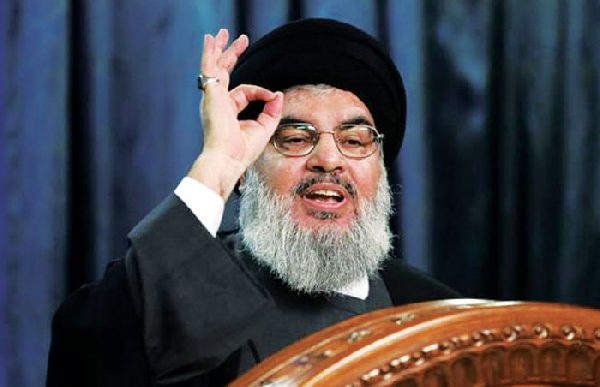
|
| Hezbollah leader Sayyed Hasan Nasrallah. |
BEIRUT — Lebanon’s Hezbollah leader, Sayyed Hassan Nasrallah, said on Thursday that Israeli strikes inside Syria were also an aggression against Syria’s regional allies, and they have the right to retaliate.
“The frequent attacks on different sites in Syria is a major breach,” Nasrallah told the Beirut-based Al Mayadeen TV. “We consider those hostilities to be against all the resistance axis.”
“(Retaliation) is an open issue … It is not only Syria’s right to respond but also it is the right of the axis of resistance to respond. When this right will be executed is subject to certain criteria … it could happen any time.”
Iran, Syria, Hezbollah and some Palestinian factions consider themselves an “axis of resistance” against Israel.
Hezbollah is a staunch ally of Syria’s President Bashar al-Assad and has sent thousands of combatants to fight alongside his forces in the nearly four-year civil war.
Israel has struck Syria several times since the start of the nearly four-year civil war, mostly destroying weaponry such as missiles that Israeli officials said were destined for Hezbollah.
In December, Syria said Israeli jets had bombed areas near Damascus airport and in the town of Dimas, near the border with Lebanon. Israel does not publicly confirm bombing missions.
Hezbollah, created in the 1980s to fight Israeli occupation in Lebanon, fought a 33-day war with Israel in 2006 in which it fired thousands of rockets that hit deep into the country.
Nasrallah said his group was ready for any possible future war with Israel, despite being engaged in the war in Syria.
“If the Israelis think that the resistance is weakened or exhausted …then they are mistaken,” he warned.
He said his military wing had learned from its fighting in Syria about how to enter villages, liberate them and establish control over them, warning that such action could also go beyond Galilee to other Israeli towns.
Nasrallah confirmed that one of the party’s officials busted five months ago was found to be working with the Israeli and U.S. intelligences, adding that it was normal given Hezbollah’s size.
“He was responsible for one department inside one of the security units of Hezbollah,” Nasrallah said, explaining that the unit conducts work of a “sensitive nature.”
However, Nasrallah said the official’s importance and status were highly exaggerated by media, adding that he was not of a high rank in the party’s security apparatus.
“He confessed to everything and to what extent he collaborated with Israel,” said Nasrallah. The collaborator’s family was responsible for informing the party about their son’s actions, he added.
“After 32 years of resistance … and with the expansion of Hezbollah’s structure horizontally and vertically, this is normal,” he said. “We should not treat it as normal, but it is.”
Nasrallah hailed his rival Future Movement leader Saad Hariri for pushing for dialogue.
“There is no doubt that the man is the one who makes decisions in the end, and he was the one who pushed in this direction [dialogue],” Nasrallah said.
Nasrallah said Future officials who opposed dialogue were “well known to the Lebanese,” and added that a personal meeting with Hariri was “possible.”
He also hailed Speaker Nabih Berri and Progressive Socialist Party leader Walid Jumblatt for working to make the dialogue possible.
He said he was very optimist about talks with the Future Movement, but stressed that the bar could not be set very high and an agreement in Lebanon was not contingent on resolving the dispute in Syria.






Leave a Reply